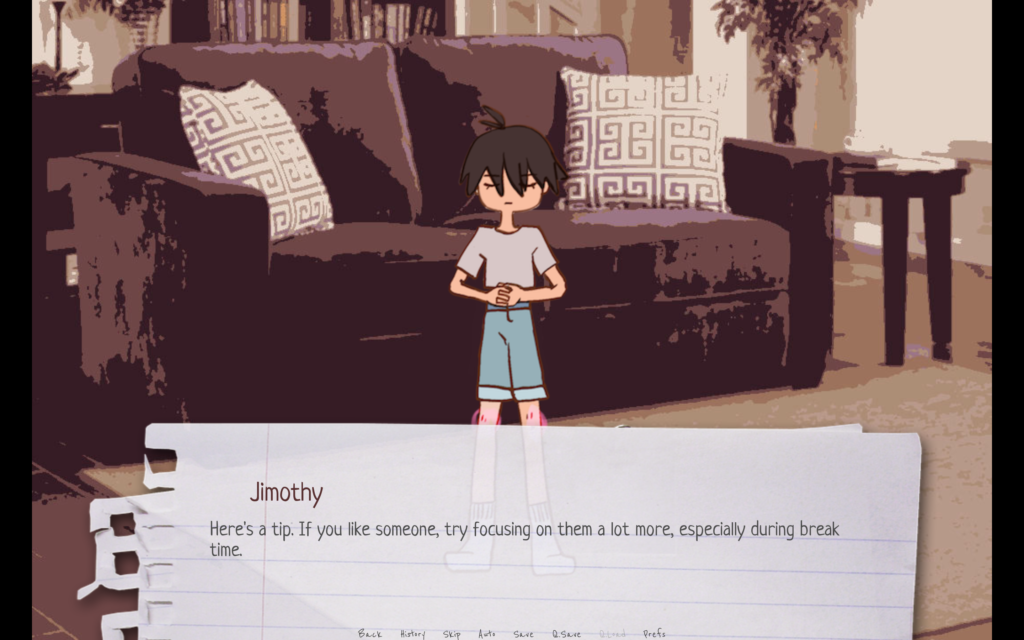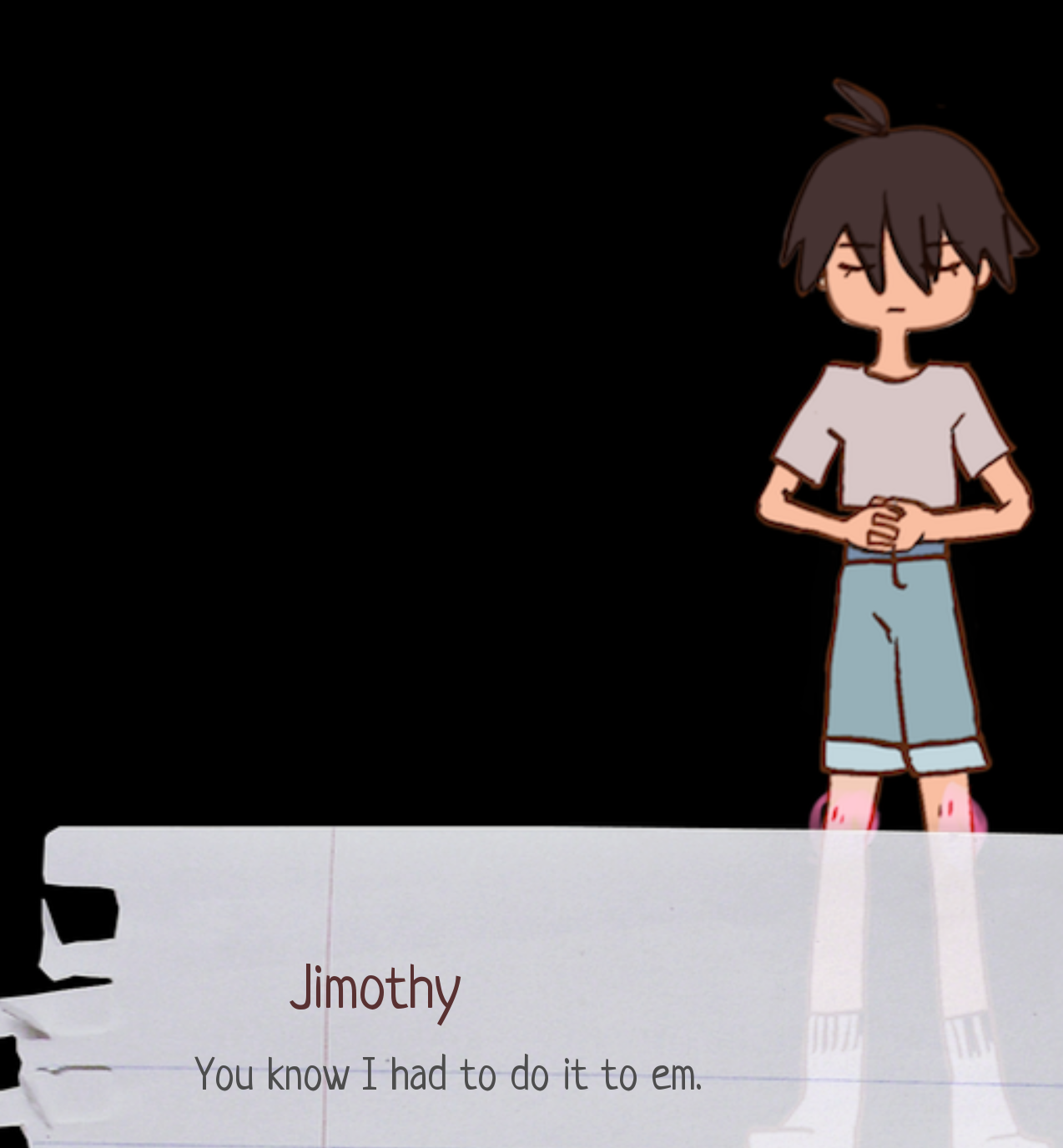In most traditional media, such as books, the main characters have complex backstories, personalities, and inner worlds. They may act differently around different people and take on many hats/roles throughout the length of the story. Most side characters are relegated to a simple archetype, so as to not overshadow the main characters’ arcs. They have a singular role, such as providing counsel for the main characters (mentor) on a journey that they can’t take themselves. In contrast, the main characters and love interests of Dungeons and Lesbians fall into archetypes and simplistic personalities (Lena is wholesome but unintelligent, Rafie and Gwen have tough exteriors but an embarrassing or quirky past/hobby) and each have a singular secret to be revealed upon replaying the game. Because Jimothy is not meant to be a main character, he is freed from these archetypes and sensible storylines, and he is able to take on different roles during different playthroughs.
For the most part, Jimothy maintains his primary personality of being an annoying brother. He’ll interrupt the game because he “wanted to feel included” …multiple times. He’ll also interrupt you if you start getting too physically or emotionally close to someone else in the house. Jimothy will always be lurking in the background, whether underneath couch cushions or watching TV. But what happens when he isn’t in the background?
The following pictures show the same scene of Jimothy in two different contexts. In the first, Jimothy is nestled underneath pillows and cushions to prank his sisters’ friends when they come by. Given the aggressive all-caps caption, you are surprised and fairly unhappy to see him. In the next screenshot, you are staying the night on the couch with him, and he is clearly not just your friend’s annoying little brother anymore. While you still may be surprised, it’s at the intensely positive emotions you’re feeling. This side to him–and you–is not a universal truth waiting to be revealed, in line with Gwen’s cryptid hunting or Rafie’s emo phase. And those aren’t his only sides.

Jimothy can act as your and Rafie’s “conscience” if you try and trash Lena’s bathroom on break, but he can also act as a “bad boy” accomplice if you and Rafie plan to hide all of the toilet paper while Lena is at the store. Arguably, this prank is an extension of his annoying brother tendencies, as is his blackmail on Rafie. However, despite being best friends, it seems that no one else in the narrative knows each others’ secrets as well as Jimothy knows theirs. He’s simultaneously a loner and loser sleeping on his sister’s couch and watching “brain-rotting” TV, but he’s actually deeply involved with the friend group, whether by inserting himself into the Dungeons&Dragons game or by gathering information.
This quasi-omniscience, flexibility with Jimothy’s roles, and ability to end up with him instead of the lesbian love interests does not mean the game itself encourages this behavior. The last role of Jimothy’s that I want to highlight is his role as a mentor to “you,” and as a tutorial to the player of Dungeons and Lesbians. If you start focusing too much on him instead of the main characters, or if you try and click through every possible option during one playthrough instead of focusing your time on developing a relationship with one main character, Jimothy will advise you against that. This advice breaks the façade of Jimothy being an immature, loner, annoying brother by showing him as genuine and with a romantic streak. And this was done while attempting to have you better romance one of the lesbians.

I recognize the irony of focusing on the one assumed-cishet character within a game titled “Dungeons and Lesbians,” but I’m sure many of us have had a fascination with the oft-queercoded side characters of movies, TV shows, and other traditional media. These characters were usually pushed into a “comedic sidekick” role, and their one-dimensional characterization allowed viewers to speculate on more complex backstories, dynamics, and inner worlds. Jimothy both subverts and upholds this one-dimensionality of side characters. While different playthroughs show different sides to him, these sides don’t necessarily coexist, since he’s molding himself to the player’s intentions. Jimothy is not a main character; Jimothy is a support character. And, in this instance, Jimothy’s character has a flexibility within his storyline not afforded to the main characters.


I definitely appreciated your analysis of the different narrative and interpersonal roles that Jimothy takes on through different playthroughs of Dungeons and Lesbians, and I really liked what you said at the very end — “these sides don’t necessarily coexist”. It got me thinking a little bit about what we inherently assume is happening in a branching narrative like Dungeons and Lesbians (or Until Dawn, etc.). When we see similar story scenes that result from slightly different choices earlier in the game (i.e. which character to stay with you in Dungeons and Lesbians), there’s a lot of implicit assumptions that we make. After all, who is to say that these two possible worlds have to be diegetically reconcilable between each other? We’re assuming (and you’re questioning that assumption) that no matter what choices we make, Jimothy is going to remain fundamentally the same person across all the possible endings. As you point out, this isn’t the case in Dungeons and Lesbians, and I’m starting to wonder why this has to be the case in other VNs. Why not a dating sim where there’s only one plot/script, and your choices just change which characters fill what role in the script?
It starts to question the purpose of choice and of meaningful choice in visual novels, and I don’t know what the answer is (perhaps I just need to play more VNs to find out…)
I loved this reading of Jimothy. While first playing through the game, I was certainly a bit confused as to what he was supposed to represent. However, It seems that he’s intended to be the sort of stand in of all other tropes not filled by the other characters, leading to his break from any one individual archetype. Using the omniscient tutorial-giver as a sort of jack of all trades that the character can still have meaningful interactions with reminded me of other dating sims (specifically Huniepop (don’t ask me why)) in which the tutorial based character can still be romanced to an extent. However, Jimothy took on even less of a specific niche in this game, really serving to be whatever the player intended to find in him. He also does have a cute outfit.